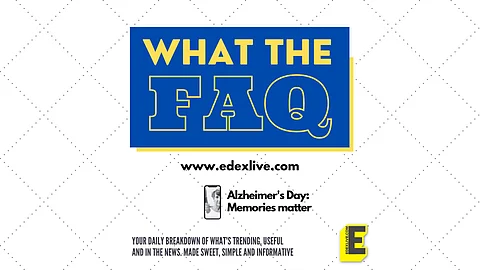

September marks World Alzheimer's Month and September 21 is globally observed as World Alzheimer’s Day. It is celebrated to address the problem of lack of awareness about neurodegenerative diseases, Alzheimer’s and dementia, and to challenge the stigma around the disease. Owing to the seriousness of these disorders, few countries celebrate for the entire month. Supporters and campaigners from around the world focus their attention on the different types of dementia and Alzheimer's while addressing the stereotypes associated with the ailment. Purple happens to be the colour of Alzheimer's awareness month and associations encourage people to use the colour to promote more awareness.
What is Alzheimer's disease?
Alzheimer’s is the most common form of dementia, a progressive neurological disorder that results in loss of memory, cognitive ability and eventually leads to behavioural changes, loss of body function and ultimately, death. The disease kills the brain cells of the patient which leads to cognitive disabilities. The disease starts slowly but gradually worsens with a life expectancy of three to nine years post-diagnosis. Alzheimer’s contributes up to 60-70% of dementia cases and according to Alzheimer’s Disease International (ADI), there are more than 50 million people worldwide with Alzheimer’s.
Named after the German psychiatrist and pathologist Alos Alzheimer’s, Alzheimer’s disease was first described by him in 1906. It usually affects people over the age 65, however, as per the Alzheimer's Disease Fact Sheet of the National Institute on Ageing, 10% of the cases may witness an early onset where individuals between the age of 30-60 may also be affected. The disease comes with a financial burden and is one of the leading causes of death.
What is the history and significance of World Alzheimer’s Day?
This is the initiative of the Alzheimer’s Disease International (ADI), the International Federation of Alzheimer’s and dementia associations around the world who are also in official relations with the World Health Organisation (WHO). Founded in 1984, ADI works with associations from 120 countries to observe Alzheimer's day and endeavours to support Alzheimer’s and dementia patients. They also conduct campaigns to raise awareness and educate people about the condition.
“Globally, we strive to focus attention on dementia, maintain it as a global health priority, campaign for better policy from governments and encourage investment and innovation in dementia research,” reads the ADI’s website and adds, “Our vision is risk reduction, timely diagnosis, care and inclusion today, and cure tomorrow.”
World Alzheimer’s Day was first introduced by ADI on September 21, 1994, at the opening of their annual conference in Edinburgh to mark their tenth anniversary. ADI’s website says, “Each September, people unite from all corners of the world to raise awareness and to challenge the stigma that persists around Alzheimer’s disease and all types of dementia.”
Even though the impact of the commemoration is growing with increasing public knowledge, the stigmas associated with the disease still remain a crucial issue as many dismiss dementia as normal ageing. Every year, ADI launches the World Alzheimer’s Report since 2009 and their 2019 report highlights this concern.
What is the theme this year?
A specific theme is given by ADI every year to focus on and the World Alzheimer’s Day’s theme for 2022 is Know Dementia, Know Alzheimer’s. ADI writes, “This year’s theme, ‘Know Dementia, Know Alzheimer’s’, continues on from the 2021 campaign, which focused on diagnosis, the warning signs of dementia, the continued effect of COVID-19 on the global dementia community and more.”
ADI’s campaign this year will focus mainly on post-diagnostic support. “Following recent developments and potential breakthroughs, in both dementia treatment and support, the campaign will aim to highlight the importance of support for people living with dementia and families following a diagnosis.”
Associations around the world working with ADI will host different activities and campaigns like memory walks, awareness-raising activities and fundraisers to draw attention to the community affected by Alzheimer's.
What are a few other facts related to Alzheimer’s?
Cause: Although a lot of genetic and environmental factors are linked with the cause of the disease, no exact cause is known. Head injury and clinical depression are also often considered to cause it, however, one with a family history of Alzheimer’s is most likely to get it.
Symptoms: Alzheimer’s develops in three stages: Mild, moderate and severe with a progressive impairment of cognitive ability. Early symptoms include mood swings, reading difficulty, language problems, confusion related to date and time, inability to remember recent events and other issues of memory loss. It is very essential to treat one at the early stages to avoid any fatality.
Treatment: There is no treatment to stop the advancement of the disease but there are ways to improve the symptoms. Psychological caregiving and the support of family and society play a crucial role in the improvement of the condition of the patient.
Prevention: Good nutrition and an engagement in proper mental, physical and recreational activities can help reduce the risk of Alzheimer’s.
To know more about Alzheimer’s and World Alzheimer’s Day, visit the website of ADI: alzint.org/get-involved/world-
